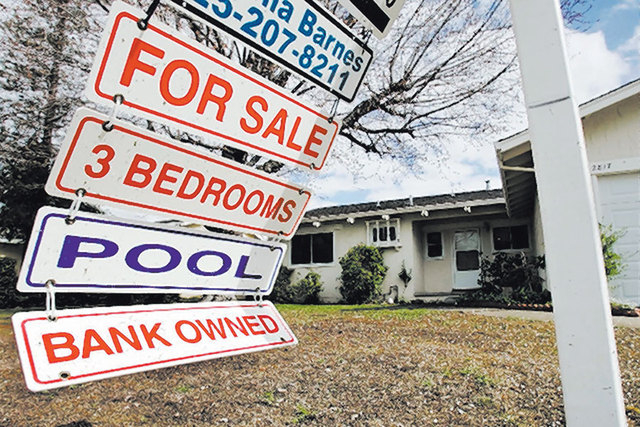With rising foreclosures, it’s not looking good for Nevada homeowners
Nevada’s foreclosure problem may be worse than you think.
California research firm RealtyTrac looked beyond primary mortgages and found thousands of Nevadans with home equity lines of credit that could soon be harder to pay off.
RealtyTrac’s Wednesday report counted lines of credit scheduled to reset to higher rates and terms between 2015 and 2018, and analyzed how many of those loans are against homes that are seriously underwater. A home is seriously underwater when its owner owes at least 25 percent more in mortgages than the property is worth.
Nevada had the highest share of such loans, with 84 percent of resetting lines of credit borrowed against substantially underwater homes, compared with 56 percent nationally. Arizona was No. 2, at 74 percent. Florida and Illinois tied for No. 3, at 71 percent.
Among metro areas, Las Vegas ranked No. 1, at 89 percent.
In contrast, 30 percent of all local homes with mortgages were seriously underwater at the end of 2014.
“The Las Vegas metro area was hard-hit by the housing crisis and while rebounding home prices have helped many, the homeowners who are still underwater continue to be at high risk for default,” RealtyTrac Vice President Daren Blomquist said. “Adding in the payment shock of a resetting (home equity line of credit) could push them over the edge. For many strapped homeowners, it could be the last straw, so we will be watching to see if there is a ripple effect in the housing market.”
Nevada has 46,047 home equity lines of credit, with a dollar volume of $2.2 billion, scheduled to reset from 2015 to 2018. Nearly 39,000 of them, or $1.8 billion worth, have substantial negative equity. The average increase in monthly payments will be $148.
In Las Vegas, 35,182 lines of credit will get new terms in the next three years. Of those, 31,168 are seriously underwater. The average monthly payment will go up $135. The peak reset year will be 2016, when 11,621 local lines will see higher rates.
Nationally, lines of credit resetting through 2018 average $90,608 to $109,161, with roughly half of the line used.
New terms on lines of credit don’t necessarily portend a new flood of distressed home sales. More than 700,000 lines, including 7,000 local loans, reset in 2014 without a corresponding jump in mortgage defaults, Blomquist noted.
But 40 percent of those lines were on homes with big negative equity, he added.
The coming wave of resets will be more than twice that share here. That’s a problem because refinancing into a lower-interest loan isn’t usually an option for homes with substantial negative equity, so foreclosure or short sale become likelier ways out.
“We are entering a period of higher risk over the next four years when it comes to resetting bubble-era HELOCs — especially given slowing home-price appreciation that offers underwater homeowners less hope of recovering their equity in the short term,” Blomquist said.
Local single-family home values are gaining about 10 percent a year, down from roughly 25 percent annually in 2012 and 2013, according to the Greater Las Vegas Association of Realtors.
Contact Jennifer Robison at jrobison@reviewjournal.com. Find her on Twitter: @J_Robison1.






















